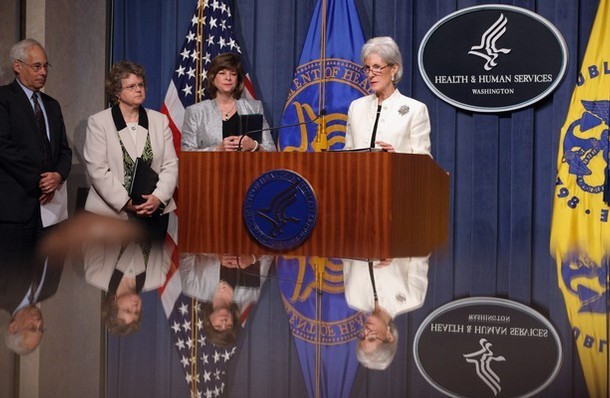Health and Human Services Secretary Kathleen Sebelius’s recent decision to require all employers who provide insurance to offer plans with contraceptive coverage under the auspices of preventive care may indicate the politicization of what is defined as preventive coverage under President Obama’s law.
The U.S. Preventive Services Task Force (USPSTF) is a federal advisory board of non-government experts in prevention and evidence-based medicine. The group conducts scientific reviews of clinical preventive health care services such as screening, counseling, and preventive medications, and it develops recommendations for primary care clinicians and health systems.
Grace-Marie Turner, president of the Galen Institute, says the task force used to be just an advisory board that decided how often women should get mammograms or when men should get prostate exams. Under President Obama’s health care law, however, it will go much farther in deciding what preventive tests and screenings health insurance plans will cover—effectively dictating what services are available in the marketplace.
“This is happening because the federal government is now going to be in the health care business and paying for everything,” she explains. “The administrative board is not the problem, and it’s always been around to help Congress make decisions. This one, however, is going to be a huge new force that decides what the government will pay for, and what exists within the marketplace because there will be billions of dollars in health [care] funding following it.”
From Advisory to Mandatory
Ed Haislmaier, a senior research fellow in health policy studies for the Heritage Foundation, says the task force started out as a beneficial organization, but Obama’s law turned it into something it was never meant to be.
“This was a perfectly okay thing before. What the task force did was have outside experts look at the data and determine what the best practices are,” Haislmaier said. “The decisions were written for clinicians and their patients so they could determine what the best treatment options were. So we had advice from experts, and if you were a doctor or patient you could take it for what it’s worth and use the recommendations or not use them.”
According to Haislmaier, the task force’s mission has now expanded dramatically.
“Now, because of ObamaCare, the board’s recommendations tell insurers and employee benefit managers what treatments they can and can’t administer. This means that we can never trust their decisions again. They will always be viewed as suspect because they might be politically motivated,” Haislmaier said.
Will Raise Costs, Rationing
Scott Gottlieb, a physician and resident fellow at the American Enterprise Institute, notes the task force currently rates services with letter grades—”A” through “D.” Sometimes an “I” is given if there is insufficient evidence to make a rating. Under ObamaCare, services rated “A” or “B”—such as colon cancer screening for adults aged 50-75—will have to be covered by health plans in full, without any co-pays. But many services that get that get “Cs” and “Ds”—such as screening for ovarian or testicular cancer—could get nixed from coverage entirely.
Gottlieb notes mandating coverage for all the “A” and “B” services will be very costly, as much as 5 percent to 10 percent of total claims or up to 20 percent of the cost of premiums.
“Inevitably, health plans will drop coverage for many services that don’t get a passing grade from the task force and therefore aren’t mandated,” Gottlieb said. “Insurance companies will need to conserve their premium money, which the government regulates, in order to spend it subsidizing those services that the task force requires them to cover in full.”
John R. Graham, director of health care studies at the Pacific Research Institute, says this will all lead to the dreaded “R” word.
“The dilemma of ObamaCare is that the government now wants to run health care. The dilemma of politicians is that they don’t want to get blamed for the inevitable rationing of health care that will occur under ObamaCare, so they’ve handed off the decision-making power to an unaccountable body,” said Graham.
‘A Busybody Panel’
Devon Herrick, a senior fellow and health economist with the National Center for Policy Analysis, says patients don’t have to worry about the USPSTF becoming a “death panel,” but it could become a bureaucratic driver of increases in premium costs.
“If anything, it is more of a busybody panel, charged with deciding when and how often we should get preventive medical screenings,” said Herrick. “My fear is that the Task Force will succumb to lobbying by special interests for specific diseases and conditions that want to ensure their respective conditions are generously covered by the mandate for preventive screenings.
Herrick said the task force is now moving beyond mere analysis and will have an outsized impact on what insurers cover.
“What was once a board that was mostly charged with cost/benefit analysis is now political in the sense it gets to decide which screenings insurers have to pay for. This is significant because a small change in the Task Force’s recommendations can change the marginal cost per life-year saved by millions,” Herrick said. “They can also cost a good deal of money.”





